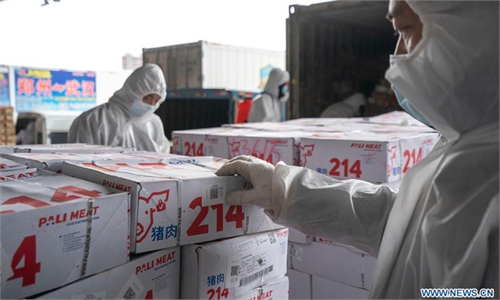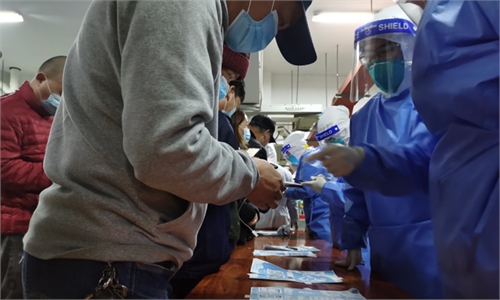Beijing tests workers from cold-chain, other key sectors on weekly basis to screen out coronavirus carriers

Beijing residents line up for nucleic acid testing in Xicheng district on Friday. Photo: Guo Zhimin/GT
Beijing is conducting nucleic acid testing among employees in key industries including cold-chain, farm market, restaurant, food delivery, public transport and daily life services, as part of ramped up efforts to find asymptomatic and imported cases.
In order to fight the resurgence of coronavirus cases, especially the sporadic outbreaks since December 14, Beijing has conducted large-scale nucleic acid tests to find potential virus carriers. As of Sunday, the city has conducted 17.46 million tests on its population with a daily testing volume of 415,680 on average, Tian Tao, deputy head of Beijing's anti-epidemic work group in charge of testing, told a press conference on Monday.
Maximum daily testing capacity has reached 1.43 million people, according to the official. Beijing has a permanent resident population of 21 million.
Beijing announced on Friday that it is organizing nucleic acid testing for over 2 million residents in the city's Dongcheng and Xicheng districts from Friday to Saturday. Residents have said that the all-member testing campaign in these two core districts could serve as a prelude to a citywide nucleic acid testing campaign in the capital, especially as the Spring Festival holiday season approaches.
Constant testing has become a major approach for screening out all the silent carriers of the virus, according to some Chinese experts, and some believe that sporadic cases in Beijing will not result in widespread transmission of the coronavirus or be serious enough to require citywide testing.
The local authority is also conducting tests among workers from key industries on a weekly basis, and has so far conducted a total of 3.5 million tests on the employees, finding one sample with a positive result.


